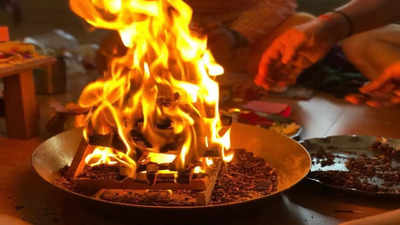
Hawan is an ancient Vedic ritual in Hinduism that involves throwing specific materials such as ghee grains, herbs and other sacred substances into the fire while reciting mantras and prayers. The purpose of holding the ceremony is to pray for God’s blessing, purify the environment, and obtain spiritual and material benefits. The havan still plays a key role in Hindu worship and is believed to have the power to purify the mind, body and soul while promoting harmony and prosperity. Whether for personal well-being, spiritual advancement or protection, havan remains a specific source of the most valuable rituals in the Hindu tradition.
The custom of Hawan originated from the Vedic period of ancient India and has a history of more than 3,000 years. It is a core component of Vedic rituals and is frequently mentioned in the Rig Veda, Yajur Veda and Atharva Veda. The customs of Homa are closely related to the worship of Agni, the god of fire. It is believed that the sacrifices offered in the fire can carry the prayers of believers to the god.
Over time, homa evolved from its Vedic origins into a common practice in various Hindu rituals. The most common forms of Homa are Soma Homa, Agnihotra, Navagraha Homa and Gayatri Homa, each of which Has its own specific purpose and mantra. Sacrifices to fire were believed to please the gods, purify the surroundings, and serve as a way to connect with the universe. Over the centuries, havan rituals have continued to symbolize the importance of fire in maintaining order and harmony in the universe.
The Importance of Performing the Fire Horse (Hawan)
purification of soul
One of the main purposes of performing havan is to purify the mind, body and surroundings. Smoke and fire are believed to purify negative energies, remove impurities and create a spiritually sublime atmosphere. This cleanse is not only physical but also mental, helping participants get rid of negative thoughts and emotions.
Pray for divine blessings
It is said that the sacrifices offered in the fire during Hawan can bring blessings from the gods. By chanting sacred mantras and hymns, practitioners seek divine protection, health, prosperity and spiritual growth. A ritual is an act of devotion in which an individual offers something of value to a god, usually food such as grains, ghee, and other sacred offerings.
spiritual transformation
Homa is a way to connect with a higher realm. It is believed that by concentrating prayers and offering sacrifices to the fire, believers can gain spiritual blessings and a sense of enlightenment. The presence of fire symbolizes the presence of the divine, and by performing havan, people aim to strengthen their connection with the divine and seek purification of the soul.
Prevent negative energy
Performing hawan is believed to protect against harmful effects like evil spirits, black magic and negative vibrations. Fire is a symbol of divine light that dispels darkness from around you and from your heart.
Restoration of karmic actions
Fire puja is considered a powerful ritual for purifying karma. It is believed that by throwing sacred substances into the fire and performing the ritual religiously, one can burn away past karma and sins and gain spiritual liberation. This makes Home particularly important in Hindu teachings on karma and reincarnation.
Protect the environment and create a better future together
The energy generated by the fire and mantras during havan is said to create a positive and healing environment. It can elevate the spiritual atmosphere, fill it with peace, and promote harmony among family members, community, and even nature. It is believed that the act of channeling sacred energy into a space can have a lasting impact on the surrounding environment.
Benefits of performing Hawan
1. Practicing havan has various health benefits. The act of throwing ghee and other sacred substances into the fire creates smoke that has antiseptic properties and helps purify the air.
2. The aroma of the offerings is believed to improve air quality, reduce toxins, and provide soothing and healing effects to the body and mind. Some believe this ritual can improve immunity, reduce stress and enhance overall health.
3. In Hindu tradition, it is believed that performing havan attracts prosperity, wealth and success.
4. Specific homas like Lakshmi Homa, Gayatri Homa etc. are performed to invite the blessings of Goddess Lakshmi, the goddess of wealth and Vedic goddess.
5. Likewise, Kubera Homa is also performed to seek material wealth and good luck. The fire in the havan ritual is said to release positive vibrations that spread to the surrounding environment, creating an environment of love, peace and harmony.
6. Performing hawan can influence the mood and behavior of nearby individuals, thereby creating a more harmonious and supportive atmosphere in a home, office or community space.
Homa rituals, especially those invoking the Gayatri Mantra, are believed to help devotees achieve spiritual enlightenment. The practice of focusing on the sacred fire and chanting mantras is said to purify the soul and help individuals move closer to divine consciousness and self-realization.
!(function(f, b, e, v, n, t, s) { function loadFBEvents(isFBCampaignActive) { if (!isFBCampaignActive) { return; } (function(f, b, e, v, n, t, s) { if (f.fbq) return; n = f.fbq = function() { n.callMethod ? n.callMethod(...arguments) : n.queue.push(arguments); }; if (!f._fbq) f._fbq = n; n.push = n; n.loaded = !0; n.version = '2.0'; n.queue = (); t = b.createElement(e); t.async = !0; t.defer = !0; t.src = v; s = b.getElementsByTagName(e)(0); s.parentNode.insertBefore(t, s); })(f, b, e, 'https://connect.facebook.net/en_US/fbevents.js', n, t, s); fbq('init', '593671331875494'); fbq('track', 'PageView'); };
function loadGtagEvents(isGoogleCampaignActive) { if (!isGoogleCampaignActive) { return; } var id = document.getElementById('toi-plus-google-campaign'); if (id) { return; } (function(f, b, e, v, n, t, s) { t = b.createElement(e); t.async = !0; t.defer = !0; t.src = v; t.id = 'toi-plus-google-campaign'; s = b.getElementsByTagName(e)(0); s.parentNode.insertBefore(t, s); })(f, b, e, 'https://www.googletagmanager.com/gtag/js?id=AW-877820074', n, t, s); };
function loadSurvicateJs(allowedSurvicateSections = ()){ const section = window.location.pathname.split('/')(1) const isHomePageAllowed = window.location.pathname === '/' && allowedSurvicateSections.includes('homepage')
if(allowedSurvicateSections.includes(section) || isHomePageAllowed){ (function(w) {
function setAttributes() { var prime_user_status = window.isPrime ? 'paid' : 'free' ; w._sva.setVisitorTraits({ toi_user_subscription_status : prime_user_status }); }
if (w._sva && w._sva.setVisitorTraits) { setAttributes(); } else { w.addEventListener("SurvicateReady", setAttributes); }
var s = document.createElement('script'); s.src="https://survey.survicate.com/workspaces/0be6ae9845d14a7c8ff08a7a00bd9b21/web_surveys.js"; s.async = true; var e = document.getElementsByTagName('script')(0); e.parentNode.insertBefore(s, e); })(window); }
}
window.TimesApps = window.TimesApps || {}; var TimesApps = window.TimesApps; TimesApps.toiPlusEvents = function(config) { var isConfigAvailable = "toiplus_site_settings" in f && "isFBCampaignActive" in f.toiplus_site_settings && "isGoogleCampaignActive" in f.toiplus_site_settings; var isPrimeUser = window.isPrime; var isPrimeUserLayout = window.isPrimeUserLayout; if (isConfigAvailable && !isPrimeUser) { loadGtagEvents(f.toiplus_site_settings.isGoogleCampaignActive); loadFBEvents(f.toiplus_site_settings.isFBCampaignActive); loadSurvicateJs(f.toiplus_site_settings.allowedSurvicateSections); } else { var JarvisUrl="https://jarvis.indiatimes.com/v1/feeds/toi_plus/site_settings/643526e21443833f0c454615?db_env=published"; window.getFromClient(JarvisUrl, function(config){ if (config) { const allowedSectionSuricate = (isPrimeUserLayout) ? config?.allowedSurvicatePrimeSections : config?.allowedSurvicateSections loadGtagEvents(config?.isGoogleCampaignActive); loadFBEvents(config?.isFBCampaignActive); loadSurvicateJs(allowedSectionSuricate); } }) } }; })( window, document, 'script', );







